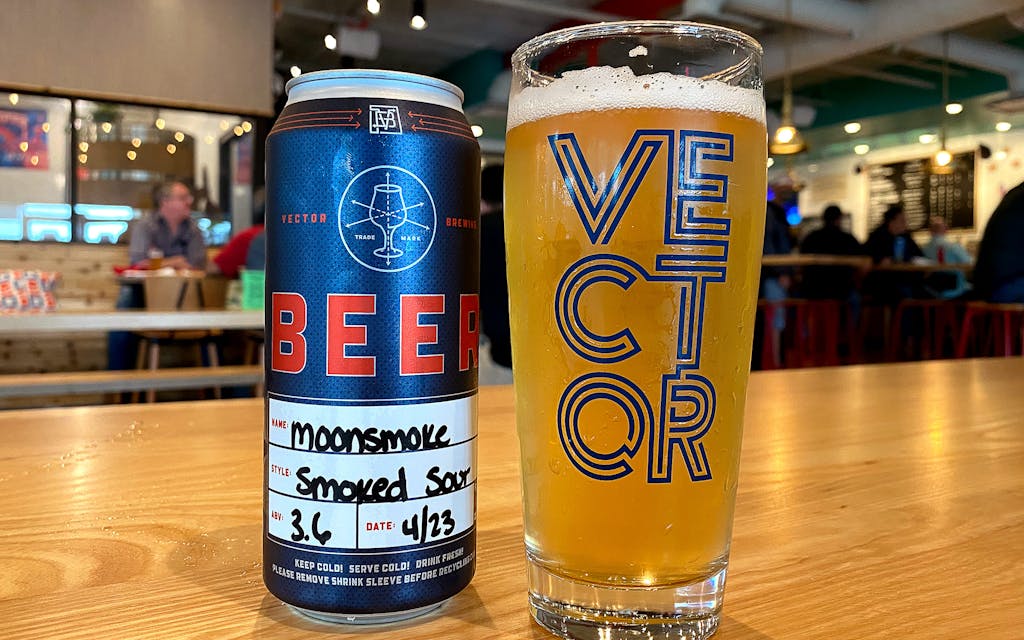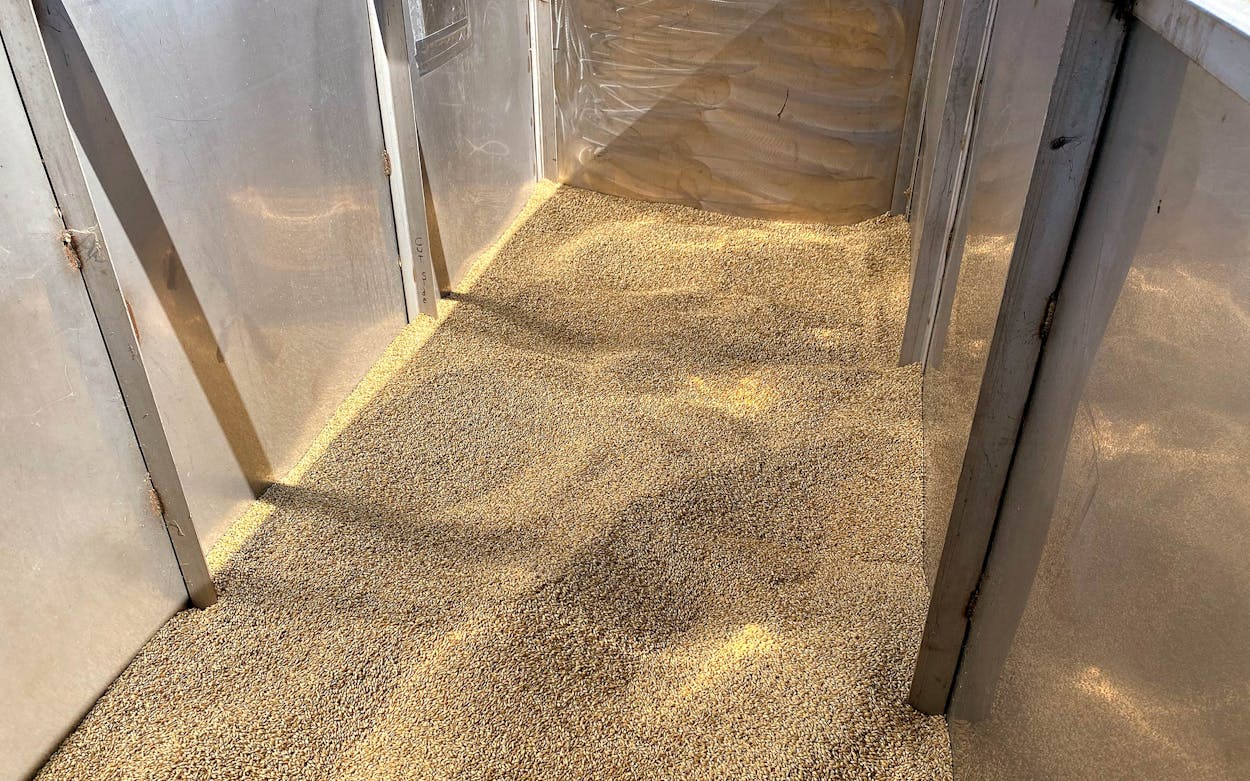JB Flowers climbs a ladder looking for smoke, then peers over the edge of a shiny smoker behind TexMalt in Fort Worth. The smoker’s reinforced aluminum walls reach seven feet high atop a foundation of freshly laid concrete blocks. A car length away, a small steel firebox sits tethered to the smoker by circular ductwork. The vessel is big enough to cook a whole steer, but it is full of grain. Flowers, the head distiller at Acre Distilling, just across Interstate 30 in downtown Fort Worth, is here to monitor the progress of the smoked malt he plans to use for another batch of his buttery-smooth Parker County Smoked Single Malt Whisky.
“We’ve been one hundred percent TexMalt on all of our whiskey products ever since they started their business,” Flowers, back on the ground, says as we watch TexMalt cofounders Austin Schumacher and Chase Leftwich place the lid on their newly built smoker. A blend of smoke from pecan logs and peach wood rises through the exhaust pipe and is expelled into the clear blue sky. Five hours later, the batch would be complete. This wasn’t Flowers’s first visit to TexMalt, but it was the maiden voyage of this particular smoker, a far cry from the metal trash can Schumacher and Leftwich rigged up years ago for their first batch of smoked malt. As one of only three major malt processors in the state—Blacklands Malt in Leander and Maverick Malt House west of Amarillo are the others—and the only one with a smoked offering, TexMalt has cornered the market on Texas smoked malt.
Malt is an essential ingredient in whiskey and beer. It starts as grain: raw barley, wheat, rye, triticale, oats, or corn. As Schumacher explains, “a malting house is a place to turns grain into sugar.” The house takes in raw grains, soaks them in water to hydrate and initiate germination in each of the kernels, then places them in a damp germination tank that tricks the kernels into thinking they’re in the ground and are about to become plants. This part of the process “makes all the starches and enzymes available” and ready to provide food for the yeast during brewing, says Leftwich. The germinated grains are then dried in a kiln, and the finished malt is bagged up and shipped off to distilleries and breweries for use in making alcoholic beverages. The whole process takes about a week. If the client wants a smoked version of any grain, TexMalt fires up the smoker with the customer’s choice of hardwoods, and places the processed grain in the smoker to soak up some of the flavor. Any of the malt varieties can be smoked, but Leftwich says the smoke seems to saturate the barley and wheat most efficiently.
Schumacher is from Houston, and Leftwich is from Lubbock. They both attended Texas Tech University, but the two never met in college. Their wives brought them together after graduation, and their mutual appreciation for beer turned into a business partnership. They opened TexMalt in 2015 with the goal to malt grains exclusively grown in Texas. Six years later, they’ve stayed on track, using mostly grains grown in the Panhandle. Schumacher and Leftwich formed relationships with local farmers and convinced them that their wheat fields could instead be barley fields. TexMalt signed purchase agreements with the farmers who agreed to make the change, and a supply chain was born.
If you’re familiar with German rauchbier (literally “smoked beer”) like Schlenkerla, you’ll recognize Schumacher and Leftwich’s smoked malt. The difference is that the big German malting houses, like Weyermann Malting Company in Bamberg, use smoky wood fires to dry the grains after germination, rather than kiln-drying them first. Live Oak Brewing in Austin serves rauchbier, including the spectacular Schwarzer Rauch, made in-house with smoked malts from imported from Weyermann. That beer has an aroma reminiscent of sausage (I find this pleasing). To win over local distilleries, TexMalt brews its own beer in-house and serves it at an invitation-only bar in back. I got to try Left Handed Wheat Beer, a smoked German hefeweizen. The smokiness was evident on the nose, but when I took a sip, it was balanced out by the breadiness of the beer. To keep the smoke flavor from becoming overwhelming, that recipe uses four parts regular malt to one part smoked.

Aside from Acre Distilling, TexMalt sells smoked malt to Garrison Brothers Distillery in Hye, Funky Picnic Brewery in Fort Worth, Freetail Brewing in San Antonio, and Vector Brewing in Dallas. To get a feel for how smoke can complement rather than overwhelm the flavor of a beer, I highly recommend a pint of Moonsmoke at Vector Brewing. It’s lichtenhainer-style, a sour beer that uses smoked malt in the brewing process. Sour and smoky might not sound like a great combination, but the two flavors mellow each other out, and it’s a favorite of the Vector staff. It’s also a beer brewed in Texas with malt that was also grown, processed, and smoked in Texas.
Schumacher and Leftwich are hoping to make their smoked malts more popular among brewers, but for now, business is good in Fort Worth. The first batch of malt in the new smoker was bittersweet, because they plan to tear it down before the end of the year. They signed a lease on a new location on the south side of Fort Worth that will allow them to triple capacity. They’ll build another smoker at the new spot, and here’s hoping that firebox will get more of a workout as brewers and distillers discover the unique flavor of smoked Texas malts.
- More About:
- Libations
- Beer
- Fort Worth
- Dallas
- Austin







